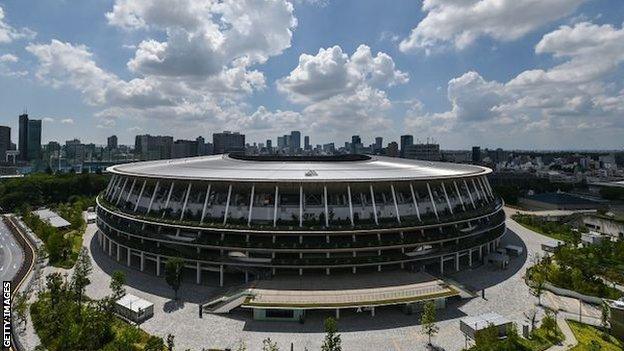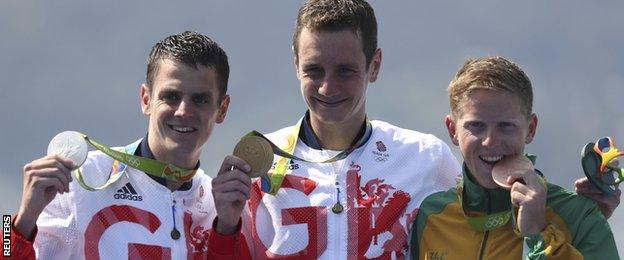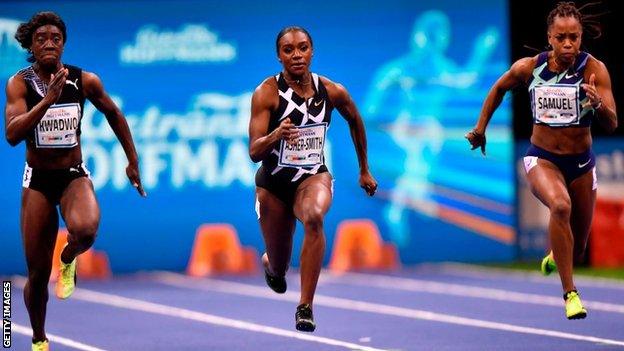Tokyo 2020 Olympics: How ready are Japan and Team GB?
- Published
100 days to Tokyo - what to expect from the Olympics
The countdown to the delayed Tokyo Olympics is on with 100 days to go to the opening ceremony on 23 July. But how prepared are Japan and Team GB and what will a Games amid a global pandemic look like?
How prepared is Tokyo to host the Games?
To say that the Tokyo 2020 organising committee have faced challenges is quite the understatement. Global pandemic and one-year postponement aside, Tokyo 2020 had to replace their president, after he resigned amid public outrage over sexist remarks. They also accepted the resignation of the opening ceremony director over inappropriate comments aimed at a female actor.
For the committee's part, however, they appear to have navigated those difficulties. They appointed a female president in Seiko Hashimoto and added 12 new women directors to the board, meaning women now make up 42% of a committee previously dominated by men.
As one might expect from the world's third-largest economy, venues and stadiums are ready. However, some of the traditional preparatory test events have been affected by Covid-related concerns.
April's Diving World Cup was at first cancelled before being renegotiated for early May. Among other events scheduled for May, the marathon swim Olympic qualifier has been moved to Portugal, and the artistic gymnastics test event has been cancelled because of restrictions for international travellers.
As for plans for how the Games might look, the International Olympic Committee (IOC) has released a first draft of its 'playbook' explaining the many rules that must be followed in order to ensure a "safe and successful" event this summer.
Among the measures include a request that spectators refrain from singing or cheering and instead only clap for competitors. Physical contact between athletes, for example hugging and shaking hands, will also be prohibited.
Teams have been asked to minimise their delegation headcount and they will have to adhere to strict guidance on hygiene, social distancing and testing. Travel within Japan for all accredited participants will be restricted and will be limited to using official transport, and only between their accommodation and training and competition venues.
Visits to tourist sites, shops and restaurants are forbidden.

The opening ceremony of the postponed Tokyo Olympics will take place at the Olympic Stadium on 23 July
Will the Games go ahead?
In March, IOC president Thomas Bach said: "The question is not whether, the question is how these Olympic Games will take place."
Until then, comments from some local officials and other prominent stakeholders had appeared to leave ajar the door of doubt. The Japanese government, though, said reports that they had privately conceded that the Games had to be cancelled were "categorically untrue".
The public in Japan also seem to be harbouring their own reservations regarding the Games going ahead. Various opinion polls over the last year have consistently revealed that the majority of Japanese citizens are not in favour - albeit dissenting voices have gone down from around 80% to just under 60% in the most recent survey.
As for the Covid situation in Japan, it has been much less severe than in many other countries around the world, including the United Kingdom. The total number of Covid-related deaths recorded in the country as of early April was around 9,300.
However, the infection rates in the Tokyo metropolitan area have been on the increase, reaching their highest numbers since the beginning of February, with the number of reported infections around 500 cases per day.
That has led to authorities re-imposing emergency restrictions around restaurant and bar opening hours, with Tokyo Governor Yuriko Koike saying it was "urgent" to take such measures, "or we are bound to see a situation where infections will spread and become more serious".
Nevertheless, with the publication of the playbooks, as well as other safety measures put in place, it appears that the Games will indeed be going ahead on 23 July, albeit in quite a different form.
Among the many protocols already outlined in order to manage the risk of infections, the biggest has been the decision to prohibit international spectators and volunteers from travelling to Japan for the Games.
Organisers could even limit numbers of local spectators. The Olympic torch relay began on 26 March in Japan but in order to minimise crowds the names of celebrities carrying the flame are not being released until 30 minutes before their leg begins.
In Osaka, Japan's second city and the current Covid epicentre in the country, the relay has been moved to take place in a park closed off from the public completely.
Despite safety measures and assurances, one nation has so far announced they will not take part, with North Korea saying their decision was taken in order to protect their athletes from Covid infection.
Bach has said that although participants will be encouraged to get a coronavirus vaccine, it will not be compulsory.
New Zealand has started vaccinating its athletes after its government classified Olympians as having "national significance".
On Wednesday, British Olympic Association (BOA) chairman Sir Hugh Robertson told BBC Radio 4's Today Programme: "We would love to get everybody [athletes] vaccinated before we go [to Tokyo]. The government is saying that all adults will be vaccinated by the end of July, so we're reasonably confident."
How are Team GB's preparations going?
The status of Team GB's preparations have been described as "progressing really well" by their chef de mission, Mark England, despite the challenges posed by the pandemic.
"Understandably, we have had to adapt to the changing climate and make some changes to our plans," said England. "We are fortunate that facilities such as our preparation camp and performance lodge will be safe, secure and fully functional thanks to all of our stakeholders in Japan.
"We have every confidence that we are going to take a very strong team to the Games, which I believe will be a unique and special chance to celebrate sport and humanity globally."
But, as in most aspects of life since early 2020, the pandemic has had a huge effect on sport and Olympic qualifying.
Many GB athletes, particularly of indoor sports, had to suspend or adapt their training schedules until last summer, when they were allowed to resume activities inside venues. It remains to be seen if and how that, as well as reduced competitive outings, may affect results in Tokyo.
Britain's boxers were hoping to secure most of their Tokyo places last year in March, but the European qualifying event in London was suspended mid-event as the pandemic took hold and only Galal Yafai and Peter McGrail were able to secure quota places before proceedings were halted.
The resumption of the event one year later was also postponed and the qualification pathway has now been modified to incorporate a ranking system as well as one other qualifying tournament.

Alistair Brownlee (centre) won triathlon gold at London 2012 and Rio 2016, and hopes to defend his Olympic title in Tokyo this summer
In triathlon, two-time men's Olympic champion Alistair Brownlee has three months in order to prove himself worthy of selection. The Yorkshireman had stepped away from Olympic distance competition in recent years to focus on Ironman-style events and, having lost a year of competition to Covid cancellations, he will need to use three or four world-level events to convince the selectors he should once more join his brother Jonny at the Olympics in Tokyo.
While many athletes must follow a delayed or truncated qualification schedule, others who would have expected to appear at the Games last year have decided that they cannot put their post-competitive lives on hold any longer.
The likes of Rio Olympic bronze medallist judoka Sally Conway, who said after retiring in February that she "100% would have competed" last summer, now feels the time is right to move on to other things.
Boxer Sandy Ryan has also decided to turn pro as the additional qualifying tournament she had hoped to use to qualify has been dropped in favour of a ranking system, in which she places too low to make the Games cut.
Yet, whereas for some the extra year was too much, for others it has helped them stake a claim for inclusion. Two-time Olympic coxless pairs champion Helen Glover retired after Rio 2016, but has made a successful return to the GB rowing squad after rediscovering her love for the sport, and her fitness level, during lockdown.
And it will be interesting to see how much an extra year of preparation could help some British medal hopes. Great Britain's track cyclists were playing catch-up to the Dutch riders in several events going into last summer - could the additional time help them bridge the gap?
Who are GB's ones to watch?

Dina Asher-Smith (centre) is the fastest female sprinter in British history
Given her consistency and successes over the last couple of years, Dina Asher-Smith is one of the main athletes who British fans will be eagerly hoping can make the podium in Tokyo.
As current world and European 200m champion it is in that discipline that she'll aim to excel. But the 25-year-old will also see opportunities in the 100m as well as the 4x100m relay, in which she also claimed medals at the last World Championships.
Staying in the athletics arena, could this be Katarina Johnson-Thompson's year?
Having initially struggled to wear the heptathlon crown passed down by Jess Ennis-Hill, with some conspicuous disappointments at world and Olympic level, Johnson-Thompson now goes into the Tokyo Games as the world champion - and a real contender for gold.
In track cycling, the Kennys, Laura and Jason, could be crowned king and queen of the velodrome. Jason is aiming to become Britain's outright most successful Olympic athlete of all time, should he add another gold medal to his current tally of six. Meanwhile, Laura is also seeking landmark golds to improve on her four titles, which could see her equal or even surpass the achievements of her husband.
And while no gold medal is certain, Adam Peaty must come as close as it gets. The world record-breaking Olympic breaststroke champion has not only dominated 50m and 100m podiums since the last Olympics, but he has also become single-minded in breaking world records in the process.
Among the less well-known athletes worth keeping an eye on are Shauna Coxsey, already a multiple bouldering world champion who will compete in the new Olympic event of sport climbing, as well as Tom Pidcock, a precocious young cyclist who's already enjoyed age-level success in various formats, and who is aiming to compete in mountain bike.
Even more precocious are Sky Brown and Bombette Martin who, at 12 and 14 years old respectively, could be GB's best hopes of a medal in the debut Olympic skateboarding event.
Elsewhere, in judo, Chelsie Giles has shown she can mix it with the best this year with a string of gold and silver medals on the Grand Slam circuit, and in weightlifting, Emily Muskett and Emily Campbell have both won historic European titles for Great Britain.

Snowfall box set: Hard-hitting drama on the epidemic that hit 1980s Los Angeles
The 'voice of golf' Peter Alliss: Revealing the charismatic man behind the microphone
